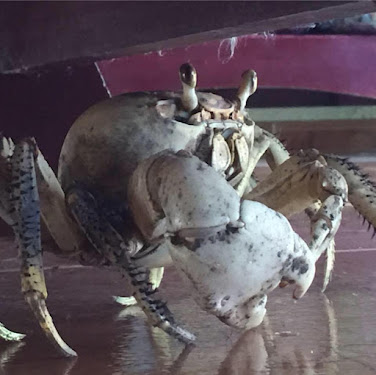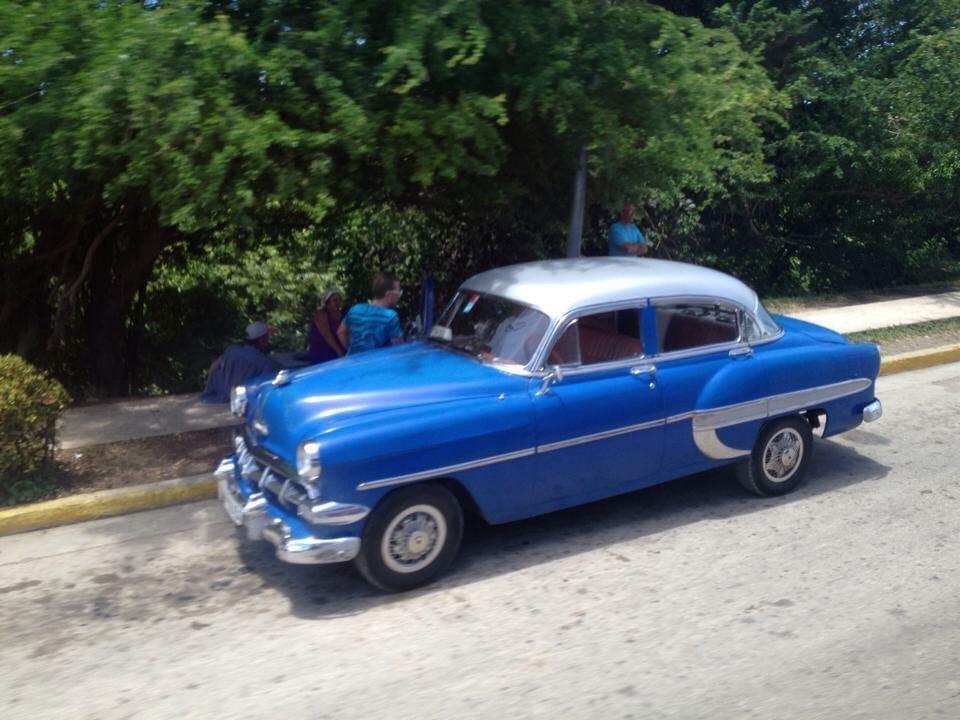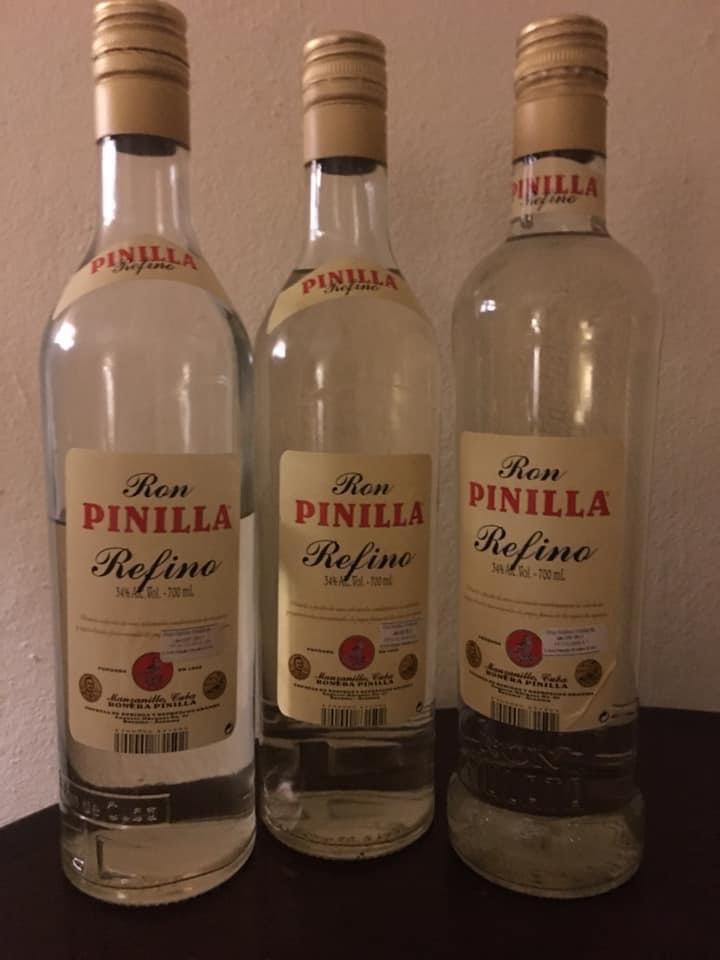by Nigel Best
(This is a cautionary fable. Some minor editing has taken place since the original story appeared many years ago.)
July 22
Well, after the drunken debacle of falling off my moped (forgot to put down the stand) and knocking over, like dominos, the 12 mopeds that were next to me, I've decided to continue exploring Cuba in a rental car.
July 23
Raced around with two bottles of rum in the car last night and woke up in a strange bed with three people I don't recall meeting. That's all I know.However, deep sea fishing today. No Old Man and the Sea comments, thank you.
*****
This old man beat the sea today! Two, count them, two marlin!! Now to eat. Then to enjoy some down time, which, for me, means what exactly?
*****
My friends from last night arrived with rum and are waiting in the lobby. Ah nightime!!
July 24
I'd never seen so many hermit crabs. Hundreds of them in hundreds of different size shells scuttling past my eyeballs where I'd come to a face-down stop in the sand at some point on my journey back to my hotel. The largest crab was in front of my right eye as it took up new residence in the remains of a coconut shell. Behind him, a line of crabs all moving into the larger abode left by the crab in front.
I needed a shell too.
I have no idea where the rental car is. I vaguely remember stumbling down a shallow river just before dawn, my body already starting to scream from hauling in those two marlin yesterday on a day-long fishing excursion.
I must have finally collapsed in the sand at the river's mouth. The last place I recall being last night was somewhere south of here where the government has evicted the fishing community to make room for a new mega-hotel. I do remember the fire we'd built using wood from the remains of someone's once-proud seaside family home.
There was music, stars, rum being passed around, conversation - some for, some against replacing existing currencies with international notes.
I heard about American embargos. I heard about the inability to import milk; Rice ration books in homes; engineers working as bellhops.
At some point I must have fallen asleep, only waking to dying embers, a severe lack of people, and no car.
I did recall that the river wound down to the sea and that I may be able to get to the beach, then the hotel.
I recall tripping over mangrove tree roots in the water. With each stumble I sensed there could be eyes of despicable creatures watching me. Cuban crocodiles, perhaps ? Jeezeus, if I’d tripped and fallen in that swamp?
Instead, I woke eyeball-to-eyeball with crustaceans seeking out new homes. My body aching from fatigue, I've arrived home and now my partner wants breakfast and sunbathing. No questions, just that look on the face that says, "No pity here!"
It's going to be a hot day, and I need to find the shell that's my car.
July 25
It was 8:10 a.m. when I got a phone call in my room. Tired hardly describes my manner. As it was, I hadn't been able to sleep last night.
How to explain that damn missing car?
The mind raced all night with scenarios.
I had not contemplated this one.
I have to go into town for noon to speak with the local constabulary.
That's all I know.
Steadying my resolve with a couple of rums as I wait out the time.
*****
When I was younger, someone told me, "Never give the game away. I wrote that today on the wall of the holding cell of the police station in Guadalavaca as I waited for my interview about the rental car I lost in Cuba.
*****
Two hours I had to sit, sweating in that cell. Plenty of time to be arrogant, I thought.
Then came a walk to an interview room, where a white-haired elderly policewoman proceeded to ask me questions about my past.
What the hell does this have to do with a rental car, I thought as she asked me about England, Canada, Bermuda, Chile, USA, South Africa, Egypt.
Then the questioning about my parents, my schooling?
Opening an envelope, she pulled out a photo of the car I'd rented.
"Si. Si," I nodded., relief flooding through me that the car looked fine. “That's it. Did you find it?"
She gave me a look I didn't like, and I started to sweat some more as she picked up the photo, then stood to leave without saying anything else.
Forty-five minutes I sat alone. Then, in came another cop, who proceeded to show me a series of photos of what could possibly have been the car.
Jeezeus, no vehicle should look like that, but hell if I knew how it came to look like a missile had hit it.
He mentioned some blood and a couple of spent shell casings, then asked me to stay where I was.
I was really sweating now, and the idea of staying in that holding cell had me wishing I'd had more rum before I'd left the hotel. What the hell happened two nights ago?
*****
Two hours is a long time to wait for anything.
Finally, in came someone who said he was a representative from the Canadian Consulate. My eyebrows slightly raised as he said "I'm Seymour Cawks."
I daren't laugh out loud. I couldn't invent this if I tried, I thought.
Seymour asked what I'd been doing and who I'd been talking to. I told him I was out for a drive, drank too much, needed to stop, fell down an embankment, couldn't locate the car.
I told him about the being lost in a river, the hermit crabs, and passing out on a beach.
Seymour explained that the police at the station were concerned that I and the car may have had something to do with the disappearance of a local U.B.A. official.
"Goddamnit! What the hell do I know about bananas?" I shouted across the table at him.
He got up and left. Another sweaty fifty minutes. My head was beginning to hurt.
When he came back he told me to stay out of trouble, as though I'm a fifth-grade school boy, and that because it's a national holiday to celebrate Castro's revolution, all the government officials, including the judges, weren't working, “This could have been more serious. The police are letting you go,” he said.
He talked to me about what could have happened. He explained that the bullet casings were of major concern as Cuban nationals are not allowed guns. The police would investigate. I had no gun, so I wasn’t a suspect, he explained to me before asking me to sign some papers and agree to not rent vehicles in Cuba for two years.
Then he waved me out.
*****
I got back to the hotel and found a note from my Cuban friends inviting me out tonight and tomorrow for rum, a pig-roast and celebrations.
How can I resist?
Viva La Revolucion!
August 5
There's nothing like opening the front door and being greeted by the sharp, gnashing teeth of irony.
I'd just made coffee a little more than an hour ago, Cuban coffee with a serious amount of Cuban rum to set the day's mood. At that moment, the doorbell rang.
Through the doorshades I could make out two men in suits, and at first I thought I was going to be met with a beautiful religious message as I stood sipping my hot rum with coffee.
Not to be!
“We’re from the Foreign Government office," one announced. "We need to talk about the recent situation in which you were involved in Cuba. May we come in?"
I took a good long drink, then showed them to the kitchen table.
A quick visit to tell me that there seems to be a bit more to the demolition of the rental car I lost in Cuba.
The basic outline is that there is a serious investigation surrounding the car, and a possible connection to someone important who has been missing for almost two weeks.
"Have you checked the trunk?" I asked, only to be met by four raised eyebrows.
"Would you like some coffee?" I then asked, and sauntered over to the kitchen counter and proceeded to pour more rum into my cup. They politely declined.
So, I now have to return to Cuba, with an m accompanying member of our fine government, on August 18th to answer some more questions.
The g-men left, for now, and I'm supposed to await telephone instructions.
"Arriba! Salud!"
August 8
So, Cuba it’s to be in just over a week. I’m to fly in and fly out; No beaches and no duty free. What is the world coming to?
My lawyer called and assured me not to worry, but, laughing, suggested no rum for at least 24 hours before I leave.
“Just in case,” she cautioned.
Was it worth asking in case of what?
I’ve been assured it's all a simple procedural item based on a mix-up at the police station from two weeks ago.
I’m not implicated in anything. I’ll be home by 11 p.m.
The escort is a fellow from the Foreign Countries Offices who will ensure that I’m taken care of.
Odd situation indeed, but life’s a dog that doesn’t always like to do as it’s told.
August 18
I'm sitting in a toilet stall at the airport and I have mere minutes to write. All indications are the next few hours could be very rough.
I stayed up last night and had a few token drinks so I could look and feel my best at 6:30 a.m. when I was picked up for this day-long excursion.
Richard had greeted me with a bemused look that quickly changed to one of concern, perhaps because of the slight smell of rum. Once in his car, I'm not sure he knew what to do when a silver travel flask emerged from my jacket pocket, other than for him to try and crack another awful joke.
I offered him some rum, but these young government types seem to have an aversion to anything that possibly hints at fun.
I'm still trying to figure out why the Foreign Office has sent a pimply-faced 20- something to escort me to Cuba for the day to answer some questions about a missing rental car lost when I was in Cuba three weeks ago.
I wouldn't have trusted me at that age to transport me at this age to a county fair, let alone across an ocean.
My mood quickly turned sour though here at the airport once we'd been shown into a side room.
Richard laid out some protocol ballyhoo, then told me that once on the plane I've to hand over my phone for the duration. Once in Cuba the passport is to also be handed over.
So here I am in this bathroom stall frantically trying to delete my web browser history, text messages, telephone numbers, and photos.
Out of curiosity last night, I shook some bones and pepper in a brown bag, tipped them out and did a reading the way I'd been shown in New Orleans many years ago at a voodoo ceremony at a house I'd been taken to by a taxi driver. That's a story for another time. The bones told me:
“You could learn a tough lesson today. More than likely, it was for you to hear. It's important that you accept failure gracefully. It could be that the one who kicks you when you're down will also be the one who helps you get up. There are strange twists to this day that you may not expect. Take things in stride."
August 21
Jeezeus! The powers that be, sitting around in offices and courtrooms deciding destinies.
The verdict was quick and three days in a Cuban jail beckoned, as well as paying the cost of the destroyed car. It could have been 10 years. No-one thought jail time would be in the cards.
Stranded, and no help from my pimple-faced representative. He just seemed angry and had little interest in how this unfolded. After signing some papers, he just upped and left.
*****
The jail was 40 minutes from Havana, and an 8-hour drive from the court in Holguin where this all took place.
Of all the prisons that have had my company over the years, this ranks as a four-star. Everything was open-air and the food was excellent, the only downside being the mosquitos, tree rats at night (once caught and cooked they taste good), and the two resident scorpions in my cell.
Most of the other inmates were inside for nothing more than petty crimes like robbing houses of food or clothing.
One man was inside for a ten-year stretch for having slaughtered two cows, a heinous crime in Cuba.
There were a couple of dissidents who had been inside for a while. For me, though, it would take Katie flying in the funds for my release and I would be free.
Two men of note though from the jail. Juan, a 70-something, who held sway each day emerging from his cell to sit on a rock and tell stories to groups of us of the glorious days of Che.
"One day," he proclaimed, "the current tides will turn, ok? A warmer wind will blow, and the peoples' revolution will claim the world. We are all one family, ok?
“Remember, he said, “you need to know where you are before you can get to where you're going"
He also asked me if I'd ever walked backwards in Cuba. Apparently this, he said, was the cause of my bad luck as only crabs walk backwards.
He assured me that crabs are the oracles of doom.
Then there was Luis Marcos, a man, so it was told, with only one testicle; A man who had killed men, sliced off their arms and legs, and eaten the bodies. He stayed in his cell and good luck to anyone who entered that place.
*****
Sitting around, there were questions about my imprisonment, and questions about home. There was much laughter about the car stories, and lots of questioning about why I'd returned to Cuba.
"Honesty?" I winked.
*****
It was sad in a way to leave today, but the three days of captivity have expired. Katie had paid, I later discovered, only $2000 for the wrecked vehicle.
Upon release it has been quite the journey back, and a little must be recounted here for this ending to be plausible.
The car that drove me back got a flat tyre three hours into the trip. After sitting around waiting for it to be fixed and eating fresh mango with a family who stopped their horse and buggy - the peoples’ limousines - to sit with us, the next stop was a small village to get lunch where five lovely chantreuses charmed us with exotic Cuban songs as we ate. Swaying side-to-side as they sang, the enchantment was complete as I ate my black beans and rice and chicken.
I could have stayed and listened all day, but Jenni Tutti, the policeman driving me back, needed us to move on.
Back in Holguin and there's Katie. After hugging me and whispering in my ear that if anything like this happens again, she will let me sit in jail, she sucker-punched me really hard.
When I got up off my arse, she gave me a lovely travel-mug full of rum and coconut juice She knows this engine runs on alcohol.
"Surprise!," announced Katie. "We are here in Cuba until Monday."
By the police station, I sat down again and wept. There I drank my libations to a great journey, journeys to come, and the goddess that is Katie.
Hasta la victoria siempre.
August 26
It ran out of the suitcase. Stowaway! A Cuban cockroach the size of a child's foot. Antennae the length of a shoestring.
Straight under the door to the basement, and damn if the beast can now not be located.
It will probably grow to a hideous size with the warmth of a basement.
Perhaps it will be best to keep visitors from going downstairs until it's coaxed out and dealt with.





